And we’re back!
As previously announced, the Speakeasy now has a book club reading QTPOC-relevant books. Over the past month, we’ve been talking/laughing/loving/breathing/fighting/fucking/crying/reading Sister Outsider by Audre Lorde. We hope you have been too, because today’s the day we’re gonna talk about it!
First up, here are some Speakeasy members with their thoughts.
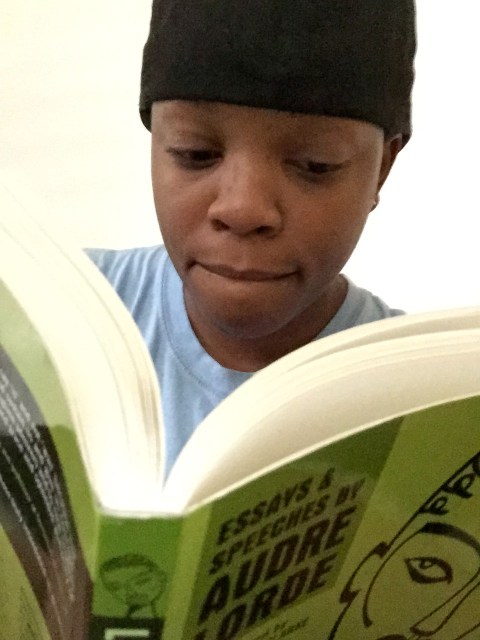
Alycea having her life changed.
Alycea:
I will start by saying I am loving everything about this book. Every sentence, every word is like a good whiskey (or maybe you’re a tea person? ydy) — it demands to be savored and enjoyed, slowly and on purpose. I underlined and highlighted so many things in this book I feared I’d ruin it. Her words are THE words I’ve wanted to read for a very long time.
“Transformation of Silence into Language and Action” is the third paper in the book and I can honestly say it changed my life. I read it twice the first time I came across it and by now I’ve read it countless times because the words are life to me.The month of October has been one of the most emotional times of my life. I applied for and got accepted to go back to college in spring semester. I started a new relationship with an amazing woman. I turned 22! In the midst of all these events I find myself in THAT position: where I am boldly stating my truths, refusing to betray myself into silence, and facing my biggest fears.
Through her words Lorde has taught me so much. She taught me that my silence would not protect me. For once I honestly understood that I wasn’t doing myself any favors hiding in corners. I came out as nonbinary to my new girlfriend. I finally told the last of my family members that I was queer AND stood my ground against her religious putdowns. I have an email template ready for my new professors telling them my pronouns. Audre said, “It is necessary to teach by living and speaking those truths which we believe and know beyond understanding.” However, she also understood that speaking truth is never without fear. It’s like she has this amazing superpower of meeting me where I was at and then raising me up to her level. I love her forever.
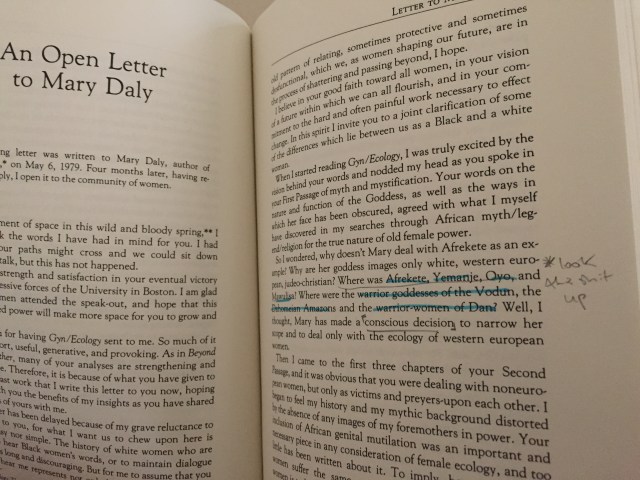
Alycea’s reading notes.
Carolyn:
Actually, it’s hard to sum up ALL the thoughts and feelings I have after reading Sister Outsider. But I can start by saying I so wish that my 15-year-old self had Audre Lorde to help her understand what she knew to be bullshit in the world around her. I didn’t know a thing about patriarchy and capitalism and privilege or any of that at 15, but I recognized that something was wrong. Something about the way I saw the world and the way those around me saw it was different. Sister Outsider gave me so much context for why I was going through THEN and still see now in my community. For example, when Lorde talks about the way black women are taught to suspect and hate each other and how that keeps us from working together against the capitalist structure, that points directly at the way we gossip and talk about each other — and even worse, how reality TV is now used as a tool to teach our young girls the same behavior. Or when Lorde talks about the Erotic and how we are taught to suppress the feelings that give us joy so that we can nurture others and or find acceptance er — that was the most amazing concept to me. It felt so real and authentic.
I also love the piece “Sexism: An American Disease in Blackface” where she digs into the chasm between black men and women and why we can’t work together because so much of that speaks to the conflict between black men and specifically black lesbian women. The piece as a whole reminded me of a quote that I heard on Oprah’s Fatherless Sons show. One of the panelists said that we teach black men that masculinity is something that can be taken away. It feels like Lorde is saying the same thing: that black men believe that they have to oppress or hold power over black women to be men. And that they feel this doubly over black lesbians because they have the audacity to say they can navigate this world without male presence.
The whole book is fascinating, and although I didn’t have it to help me along the way at 15, I am glad I had it to help free me at 35.
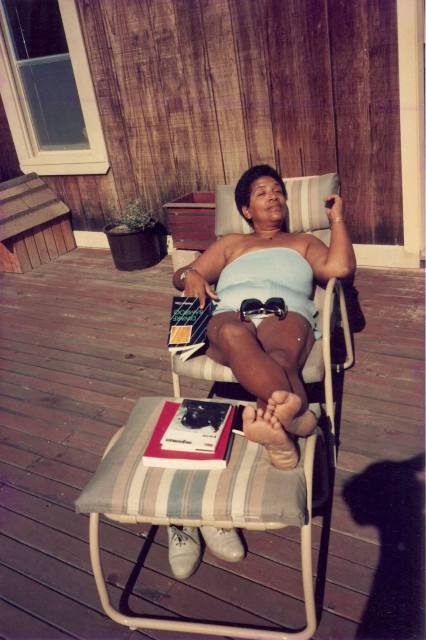
Audre Lorde kicking back. Via Audre Lorde The Wind Is Spirit Facebook.
Nicolette:
“I usually find myself a part of some group defined as other, deviant, inferior, or just plain wrong.” — “Age, Race, Class, and Sex:Women Redefining Difference”
Sister Outsider breathed life into the fragments of thoughts that have been floating in my head about being a queer, black, woman in a racist patriarchal society. Everyday I wake up and there is something in the media, or a word spoken to me that tries to solidify my place as a lesser being on this earth. It’s hurtful to know that the only reason why I’ve been marked as inferior is due to people who have unjustly exerted their racial, sexual, and gender privilege to demean me. Nevertheless, throughout the tears, the anger, and the loneliness I try to work everyday to practice small acts of defiance as a way to temper the wrongs that have been directed at my people.
When I express my ideas in classrooms full of white students, I am saying that no matter the institutional blockers that have been put in place to hold my people back, my voice will be heard. When I walk through the doors of a church, I am saying that no matter what you feel about homosexuality, I will not allow you to block my right to worship. It’s a dangerous and unforgiving job, though. I hope that when my children arrive this is not what they must put up with in order to be viewed as a human being.
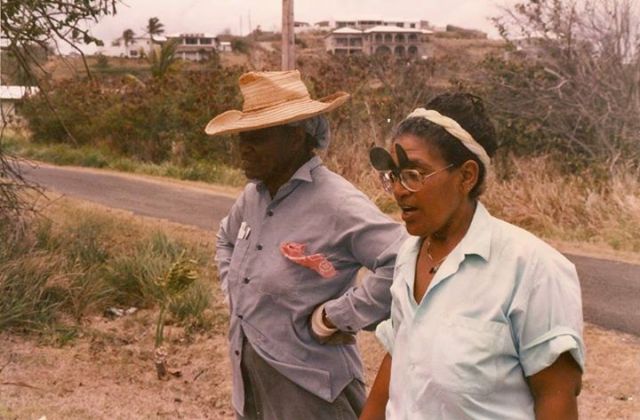
Audre Lorde and her partner Gloria Joseph hatching a plan. Via Audre Lorde The Wind Is Spirit Facebook. To support Joseph’s bio/anthology of Audre Lorde, visit the Kickstarter open now through November 3.
“Ignoring the differences of race between women and the implications of those differences presents the most serious threat to the mobilization of women’s joint power.” — “Age, Race, Class, and Sex: Women Redefining Difference”
“The oppressors maintain their position and evade responsibility for their own actions. There is a constant drain of energy which might be better used in redefining ourselves and devising realistic scenarios for altering the present and constructing the future.” — “Age, Race, Class, and Sex: Women Redefining Difference”
I am not afforded the luxury of solely viewing my life through the lens of being just a woman. How I look at and interact with the world is a complex mixture of factors that cannot be easily separated or ignored. It wasn’t until I was 25 that I really begin to explore whether or not the feminist label was for me. I was so hesitant to wear it because I didn’t see much discourse on how intersectionality impacts how women of color navigate the world.
In order to create solidarity amongst women we have to begin to create a more nuanced dialogue that encompasses the differences women of color experience, and begin to weave these stories into the fabric of feminism. However, this fight to include women of color should not land solely on the shoulders of the oppressed. I shouldn’t spend all of my time having to educate you about my experiences, or why my story should be included. Instead, those who are privileged should work on recognizing it, and seek to educate themselves about how to become more inclusive.
If we don’t make those steps forward, I fear feminism will remain fragmented.
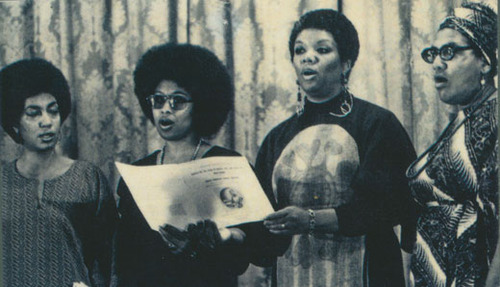
June Jordan, Alice Walker, Lucille Clifton, and Audre Lorde, At Phillis Wheatley Poetry Fest, 1979.
“Somewhere, on the edge of consciousness, there is what I call a mythical norm, which each one of us within our hearts knows “that is not me.” In America, this norm is usually defined as white, thin, male, young, heterosexual, christian, and financially secure. It is with this mythical norm that the trappings of power reside within this society.” — “Age, Race, Class, and Sex: Women Redefining Difference”
Meritocracy is a tool that is used by the privileged to place the blame for financial and educational stagnation on black and brown people. The real truth is society is not rooting for us. Instead, it allows institutionalized racism, abject poverty, and inadequate schools to disproportionately affect communities of color. So while I possess a college education, and a good job in the grander schemes of things it doesn’t matter. As long as my people are still being gunned down in the street, struggling to put food in their fridge, and having their schools closed then I haven’t made it. Until all my brethren (black, queer, and women) can move through the world unhampered by racism, sexism, and homophobia then the fight must continued to be waged.
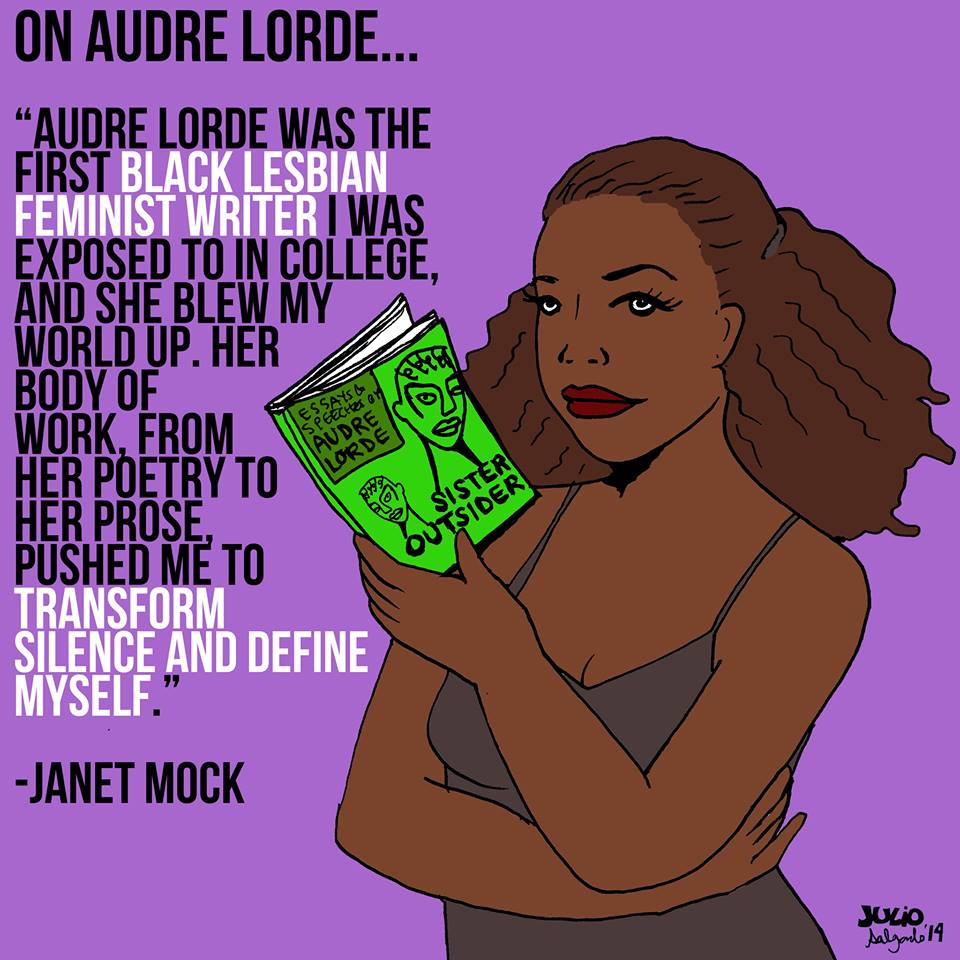
Janet Mock read Audre Lorde in college and loved it. Via Queer WOC Tumblr.
Gabrielle:
My response to racism is anger. I have lived with that anger, ignoring it, feeding upon it, learning to use it before it laid my visions to waste. … Women responding to racism means women responding to anger; the anger of exclusion, of unquestioned privilege, of racial distortions, of silence, ill-use, stereotyping, defensiveness, misnaming, betrayal and co-optation. — “The Uses of Anger: Women Responding to Racism”
“Uses of Anger.” That’s the essay I read three times. The one that reminded me of how I used to punch my fists through walls because I didn’t have the language to dissect and understand the complexities of my rage.
Audre Lorde doesn’t waste time on the theoretical aspects of racism. She starts off the essay with a clear definition of racism. Anger is her response to that racism. There are no apologies or self-deprecating clarifications about her anger. Racism begets anger. That is a truth and right after that truth is shared, Lorde provides eight examples of how racism inserts itself into her academic life, dealings with white feminists, and all around violates her existence as a Black lesbian, a mother, an academic, a human. Eight, only eight of the many, moments when every point of her existence was desecrated by some racist bullshit.
Most of the examples are ways in which white feminists have been embarrassingly short-sighted in their understanding of equality for women. In Lorde’s anecdotes, I found myself swapping her feminist conferences for my AP History class and her white feminists with the WASPs that dominated my high school. It’s easy to insert myself in Lorde’s essay on Anger. In “Uses of Anger,” Lorde addresses Black women and Women of Color. She pulls us together in this dialogue to understand our collective anger and the ways in which it can be the thing that rips us apart or strengthens us.
“Anger is loaded with information and energy. When I speak of Women of Color, I do not only mean Black women. The Woman of Color who is not Black and who charges me with rendering her invisible by assuming that her struggles with racism are identical with my own has something to tell me that I better learn from…If I participate, knowingly or otherwise, in my sister’s oppression and she calls me on it, to answer her anger with my own only blankets the substance of our exchange. It wastes energy.” — “The Uses of Anger: Women Responding to Racism”
As a Bronx-born Puerto Rican, I never know exactly where I fit in most discussions about racism in the United States. I’m not white. I’m not Black. I’m in between but I know for a fact that if white power structures decided to round up all the minorities, I’d be with all the blacks, browns, beiges, yellows, others. Still, where is my place in a conversation whose roots are so connected to slavery in the United States? Our industry and economy in this country are all based on wealth garnered from that slave trade, so how dare I even open my mouth when my people didn’t even get here until the 1950s?
But Puerto Ricans are a people with a legacy that comes from the slavery, rape of its indigenous people and their resources by the Spanish, whose efforts are kept up by the United States government… so there is no reason to keep my mouth, there is no reason to not hear my sisters. At times, we share the same scream.
It’s imperative for us to inherit our own spaces. Black lesbians need to be around other Black lesbians the same way that brown round latin@s need to be around other brown round latin@s and Filipino transmasculine people need to be around other Filipino transmasculine people and so on forever. We just need to always remember to use of energies and make as much space to come together.
Lorde commands us, as an act of love, the love that comes out of anger, to speak to each other and share the reasons for our rage. It is my duty to help my people carry this rage and work through this anger. If we aren’t listening to each other then we are allowing these systems of oppression to remain in place. White women are only part of the community if they do the work. If they confront their own connections to the evils of racism and the ways they benefit from and perpetuate them.
Anger is a tool of survival. It must be confronted, shared, swallowed, and re-born into something greater. We must create a world that is better for us.
“I have suckled from the wolf’s lip of anger and I have used it for illumination, laughter, protection, fire in places where there was no light, no food, no sisters…we welcome all women who can meet us, face to face, beyond objectification and beyond guilt.” — “The Uses of Anger: Women Responding to Racism”
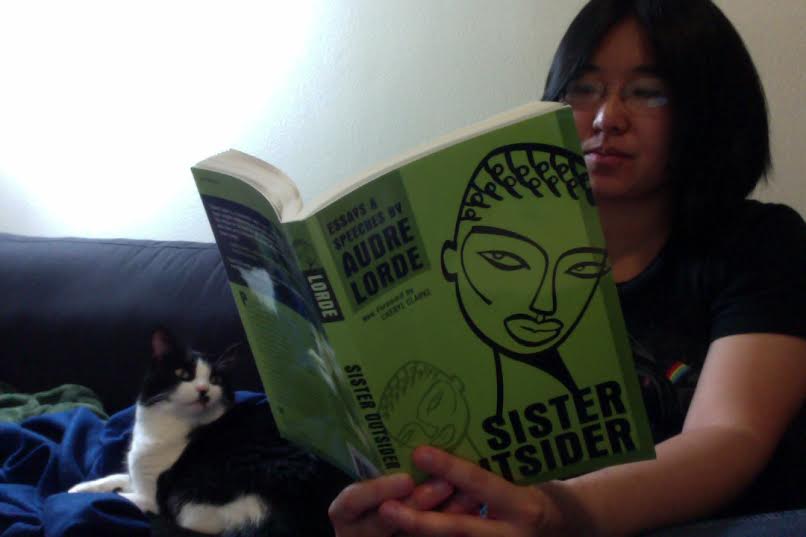
Sonia
Sonia:
When I read Sister Outsider, I couldn’t help notice that the book continues to be so relevant. If it were not for the footnotes and asterisks, I might not have realized it was written decades ago. In a way, it’s a testament to the brilliance of Audre Lorde, but in another way, it is sad. Sad because it shows me how much work we still have to do, and how non-inclusive and non-intersectional mainstream movements for equality continue to be.
As a science major, I did not take any women’s or ethnic studies courses in school. For me, it was through the lens of my burgeoning understanding of my queerness that I witnessed very visible forms of legislated/institutionalized oppression and started learning and educating myself. My turning point was in 2008 with Proposition 8 in California, which I consider my activist awakening, and through that I began to learn and read about queerness, feminism, racism, and other identity-related forms of resistance and oppression. I read many quotes and excerpts from hooks and Lorde, but I am ashamed it has taken me this long to sit down and read through a compilation of Lorde’s essays.
Throughout Sister Outsider, I really enjoyed finding references to the other passages. For example, in the interview with Lorde and Adrienne Rich, I really appreciated the references made to “Scratching the Surface” and “Uses of the Erotic,” because I was able to reread them to glean more insight and find new points that I’d missed. I feel like I could read this book often and still take new emotions and thoughts away.
Two passages that really resonated with me in light of Ferguson:
“Some problems we share as women, some we do not. You fear your children will grow up to join the patriarchy and testify against you, we fear our children will be dragged form a car and shot down in the street, and you will turn your backs upon the reasons they are dying.” — “Age, Race, Class, and Sex: Women Redefining Difference”
“Without community there is no liberation, only the most vulnerable and temporary armistice between an individual and her oppression. But community must not mean a shedding of our differences, nor the pathetic pretense that these differences do not exist.” — “The Master’s Tools Will Never Dismantle the Master’s House”
Okay, cherry blossoms! We hope you’re feeling inspired, because we’ve now reached the part where we talk about this book as a family. This discussion is open for everyone.
If you can’t think of what to say, here are some places you could start:
- What was your favorite passage? Favorite Audre Lorde quote in general?
- Are there any books you’ve read as an adult that you wish you’d had as a kid?
- How does anger inform your feminism? Do you find it energizing? Draining? Something else?
- In “Scratching the Surface,” Lorde speaks about the need to fight oppression vertically rather than horizontally. She writes: “Black women are programmed to define ourselves within this male attention and to compete with each other for it rather than to recognize and move upon our common interests. The tactic of encouraging horizontal hostility to becloud more pressing issues of oppression is by no means new, nor limited to relations between women. The same tactic is used to encourage separation between Black women and Black men.” Can you think of any other examples?
- POC readers, was there anything in Sister Outsider you found particularly similar/dissimilar to your experiences? What, if anything, do you perceive has changed for POC since these essays were originally published (1984)?
- What do you want the Speakeasy Book Club to read next?

Alycea, happy birthday and congrats on coming out to your remaining family!! This is the best news.
Sonia – I don’t think there’s any shame in not having read Sister Outsider (or any other major feminist work) until now. I know when I was in school for engineering, there was basically ZERO push for me to read anything outside of my field of study. (I didn’t even have to take an English 101 course, because I’d taken advanced classes in high school!) So I’m in the same boat as you.
Sometimes it seems like everyone here has read absolutely everything, but they all started out not knowing things… you know? I think it’s awesome that you’re taking your education into your own hands, and I’m excited we can learn together. :)
Yes yes and yes!! I’m glad that we got the opportunity to read this as a group and get it out their to more AS readers!!! It’s such an important piece of work. But I am going to step back and let the other readers post their comments!
Gabby, I really empathize with this. While I think there’s something to be said for exercising caution when it comes to speaking about experiences that are not our own — I’ll never know what it’s like to be Black, for example, so I shouldn’t be weighing in on that — I also think a productive way forward is to find those experiences that *are* the same, and to build from there.
The context was a little different here, but I like what Lorde said in Learning from the 60s:
It just makes me appreciate our Speakeasy even more, if that’s possible.
Our persistence in examining the tensions within diversity encourages growth toward our common goal.
i love this line. thanks for sharing all of this. i think sometimes that our national dialogue on race leaves this part out, it leaves out the moments where people of color talk to each other. those conversations are just as difficult and strained and emotionally exhausting as the ones that are us v the dominant group.
i like that this – the book club- is one way to begin/continue these discussions. i wonder what other things we will come up with. let’s just read audre lorde forever, k?
All of this was so good and now I need to stop being a loser and go buy the book. Ugh I am just literally always so thankful for the speakeasy and autostraddle and all you perfect little humans out here who inspire me to read good shit. More books (that I will also read with y’all!!)
yo I didn’t buy a copy of Sister/Outsider. I ordered it from the library. i mean, everyone should own a copy of one of Audre Lorde’s books, but like if cost is holding anyone back: library alll the wayyyyy.
and you’re not a loser, you are a love.
I definitely just got a public library card to do like win of the century.
also <3
I really enjoyed reading everyone’s responses and the quotes that spoke to y’all the most. This is certainly on my list of books to read ASAP! (I have a long list and I just finished reading Mia McKenzie’s The Summer We Got Free and I’m about to read Gloria Anzaldua’s Borderlands, abookishouldvealreadyreadIKNOW!) Anyways, this was just a taste of the knowledge found in Sister Outsider and I want more. So, I will definitely get to this one soon. I’m excited for this Speakeasy Book Club to continue. <3
I have so been wanting to read Borderlands!
then i’m officially suggesting it for the next speakeasy book club!
“But community must not mean a shedding of our differences, nor the pathetic pretense that these differences do not exist.”
Best quote.
I bought the book with the intention of reading and participating in the discussion but then a library book that I’ve waited months for came in and I read that instead. Thanks fellow Speakeasy-ers for making sure Sister Outsider stays at the top of my to-read list. I <3 you guys!
Forever kicking myself in the butt for being late to the strong black feminist party. Haven’t read this, but I sure will now.
SO Gabby, I just read Uses of Anger at work last night and I had to read it a few times to make sure I got everything. I think I need to read it a few more times. God bless Audre Lorde and her gift with words. I don’t think I could ever articulate myself in the same meaningful way she does. Having the words to express my anger is how I can continue to grow and create change, and I wouldn’t have believed it without this book.
I think I’m just going to buy copies of this book and hand them out for Christmas. Happy holidays, I wanted to talk to you about our Lorde and savior! Oh my gosh I just thought of some christmas carols for this…I need to stop.
I’m personally really stoked for Our Lorde and Savior’s Holiday album
Lately, I feel like I’ve been stumbling my way through my identity trying to put the pieces together. I went through a period of time learning about the basics of feminism and defining myself as a woman. I went through another period of time grappling with my sexual orientation and ultimately identifying and defining myself as a lesbian, but figuring out my identity as a WOC has been the hardest and longest journey. I identify as multi-racial – half black, half white – and I present/appear white based on the color of my skin. There are a lot of stereotypes about what it means to be black and I never fit into any of them; I didn’t know any better for a long time and that shaped how I defined myself. I didn’t think I had the right to define myself as WOC. Recently, I have started taking the time to really figure this out for myself and consider how all of my identities shape how who I am.
Considering all of this, my favorite piece in Sister Outsider was “Age, Race, Class, and Sex: Women Redefining Difference.” I feel as if I have internalized the effects of difference that Lorde discusses in this essay, but my identity cannot be considered in fragments.
This is a beautiful space. I definitely missed this reading wagon, but I’m gonna be up on the next book and ready to contribute to these much needed conversations and awakenings. Love, yall!
i love everything happening in this post. seriously. your words – all of you – are so fucking beautiful. and even if i missed the book club cutoff, i am soooo going out and getting this book immediately.
thank you to everyone who was a part of this and thank you audre lorde for the world!
Loved reading everyone’s perspectives and how they relate to pieces within the book. Thanks so much for sharing this post and putting together the speakeasy book club! I’m late as well BUT I will get my hands on a copy this weekend and I can’t wait to read this inspirational book
This is SUCH an awesome book. Audre Lorde is incredibly fierce, passionate and unrelenting, and just such a beautiful writer. I read this book many years ago but I remember this particular story where she’s in Russia and has this kind of insta-love with a woman who she has no common language with but they are just reading into each others’ souls…there are lots of incredible essays in the book but that moment has really stuck with me.
I downloaded the ebook, and somehow life got away from me and I wasn’t able to actually read much. I’m so appreciative of this post. I feel like when I get a chance to sit down and read, I want to start from the pieces you mentioned. But ooh damn, if you guys didn’t just dig into my soul and read me.
Nicolette- I love how you’re using your everyday life as defiance, I’m always looking for the simple ways to get those jabs in as I can. I grew up in an extremely conservative Catholic household and that clash of identities never was really resolved, so it’s really dope to see you, empowered and continuing to rock with your faith, in spite of those roadblocks.
I feel like Sonia and Gabrielle really spoke to how I feel about a lot of these conversations. I always want to be involved, I’m always trying to learn and further myself in my own identity development, work towards change, develop and channel this anger in a positive way. But I only recently have started to grow the vocabulary to communicate my thoughts or name what I’ve been experiencing, because I never studied anything like this in an academic setting. I appreciate someone else coming out and saying that- makes me feel more connected instead of uneducated. When I was little, I found myself trying to bounce between groups of kids trying to fit in, and that’s how I sometimes feel about these conversations, too, like, “am I allowed to have a voice here?” It’s not really my space. Thanks for voicing that, I know a lot of people feel it
Anyways, all of you are awesome, and I’ll keep your thoughts in mind as I finally sit down to read it myself.
I did not get my homework done in time to participate in this (for shame!)
But shoutout to the speakeasy for getting this whole thing rolling. It’s really beautiful to see y’all (re)discovering yourselves, and I’m grateful that you’re all willing to share your thoughts, insights and feelings with the rest of us. Xoxo
This is one of my favourite books of all time and I’ve kinda accepted Audre as my personal Lorde and saviour. It was so great to read all of your reflections on her words. Can’t wait to see what is picked next!!
I just started reading it but it’s eerie how much Lorde’s words (still) resonate. Reading her words makes me desperately want to write again, she’s so passionate and clear and amazing. I loved this piece and I wish I could respond to all of your responses but it’s hard going typing on a phone. Like Alycea, Transformation of Silence Into Language and Action is my favourite but really, I devour everything she writes. Thanks so much for this space, sorry I’m late to the party.